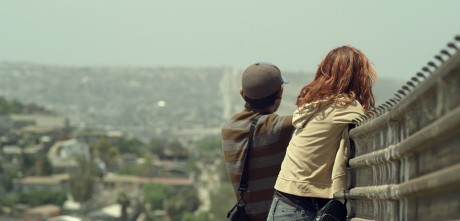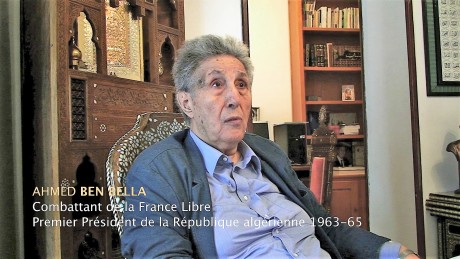VIVIANE CANDAS: ALGÉRIE DU POSSIBLE / A POSSIBLE ALGERIA
French director Viviane Candas grew up in Algiers, where her father, the lawyer and anti-colonialist Yves Mathieu, worked for the Algerian government after the country’s independence in 1962. Following eight years of war against France, one of the most brutal in colonial history, the reconstruction of Algeria was a political experiment striving to create a fair and equal society, notably through extensive land and school reforms. Yves Mathieu died under mysterious circumstances in a car accident in 1966, shortly after Ben Bella’s revolutionary regime had been overthrown by a military coup. Guided by her personal story and through the superb editing of rare archive material and recently recorded interviews with key figures, Candas introduces us to the unique moment of Algerian history just after the revolution.
Senior researcher at DIIS Rasmus Alenius Boserup introduces us to the subject before the film, and after the screening, the director and he will discuss the significance that French colonial history has had and still has for both Algeria and France even today – and they will talk about the role the Algerian revolution played at the time. This is the film’s Danish premiere. The debate is in English. Tickets: 95/65 kr. The event is supported by the Institut français. (Docs & Talks’ programme)
Algérie du possible / Viviane Candas, 2016 / eng. subtitles / SUN 25/02 14:00 / Cinemateket, Copenhagen
KOMMENTAR
Filmen bygger på stemmen, filminstruktørens egen stemme. Den fortæller historien. Det kan jeg altid godt lide, det er reelt, det er litterært, tæt på skrift, tættere end en ren billedside. Og Viviane Candas stemme gør mig tryg og lyttende selv om, hvad den fortæller mig er forfærdende. Dernæst bygger hendes film på arkivmaterialet, en sjælden samling historiske optagelser klippet sammen med et privat arkiv. Det kan jeg også næsten altid godt lide, i hvert fald, når det er poetisk konstruktion som her og ikke et formidlende pensum. I Candas’ værk er det selve forbindelsen mellem verdenshistorie, Algeriets historie, Frankrigs historie og undertitlens Yves Mathieus biografi. Han var Viviane Candas’ far, fransk som hun, men dybt forbundet med Algeriet i landets skæbnetime. I titlens og undertitlens indhold ligger filmens fortælling, og i modstillingen samfund / nation / folk og person dens ekstistentielle drama, dens identitetsovervejelse. Endelig bygger filmværket på Candas’ enestående følsomt ærlige interviews med nogle få af fortællingens nøglepersoner, som i den litterære ånd mere er søgende samtaler end faktuelle spørgsmål/svar scener. De er lavet helt uensartede, og de vidner om en langvarig indsamling af filmens optagelser, som kædes sammen af vignetter fra researchrejserne i en rekonstruktion, som har en fast billedmæssig ensartethed, som et eftertankens hvilerum. Men mærkeligt nok gør det dem ikke til filmens, fortællingens nu. Det gør Candas’ fortællestemme, og det gør de medvirkende, som fører ordet i interviewscenernes samvær, samtaler hvor instruktørens stemme oftest er klippet fra, men mærkeligt er hun meget til stede. Det bliver til mit møde med disse mennesker, og mødet med en gammel Ahmet Ben-Bella er et emotionelt chok. Her er filmværkets nu, her er selveste verdenshistorien til stede i denne skrøbelige krop, som taler om sig selv som socialist. I dag, nu…
2
Krigen i Algeriet var et fransk anliggende, som jeg husker den, og krigen var det franske militærs brutalitet. Jeg læste om Djamila Boupacha i tidsskriftet Perspektiv, en bestemt replik fra hende under retssagen, en oplysning, hun kom med, sidder i min hukommelse endnu, ryster mig endnu, fordi jeg husker, hvordan det var med mig og viden om voldsom brutalitet dengang, og hun var altid Picassos tegning, men det handlede ikke om Picasso, i stedet fæstnede hun sig; hun, modellen indprentede sig ved det lille portræt tegnet efter et fotografi stærkere end tegneren på en måde modsat Guernica, som altid var den berømte maler mere end den ulykkelige by. Og jeg læste i Simone de Beauvoirs roman Mandarinerne om det franske intellektuelle venstre i 1940-erne, om Camus og Sartres kreds. Og jeg læste om krigen og om general Jacques Massu og hans faldskærmstroppers sejr i 1957 over modstandsbevægelsen FLN i hovedstaden, som han trevlede op ved vilkårlige arrestationer og brutale forhør og systematisk tortur. Det var Slaget om Algier, som i 1966 også blev en film af Gillo Pontecorvo med Jean Martin i rollen som oberst Mathieu, som nok er et portræt af general Massu, en spillefilm i dokumentarisk sort-hvid billedstil med amatører lige fra gaden i de fleste andre roller. Den mimisk dokumentariske kvalitet i Pomtecorvos film er så forbavsende, at Candas har kunnet bruge scener derfra som en del af sit arkivstof, for eksempel henrettelsesscenerne.
3
Titelsekvensen, de første billeder, broen med bilerne i bjerglandskabet, vejene set fra bilen, jernbanestationen med toget en almindelig dag og billedernes hele stil og deres særlige tekniske kvalitet definerer filmens tid som nutid, netop nu, hvor den optages og nu, hvor jeg oplever, den erindrer historien om Algeriets frihedskrig som spredte fragmenter bundet i arkivets film, fotografier og dokumenter, som bliver gennemgående lag i dens arkitektur, dens datid.
4
De medvirkende i samtalerne er i dette nu, instruktørens stemme er i dette nu, vignetternes scener er dette nu, de rammer det ind med nutid, også arkivoptagelsernes lag, som i den fornemme klipning skrevet i filmens datid. Det er hukommelsens svage billeder, brudstykker af dengang, som stemmerne føjer detaljer til. Alt det forfærdende. Men også opklaringer, hvordan, det virkelig skete. Guillotinen i fængselsgården, henrettelsen af en algerisk modstandsmand, hvordan en afkørsel ved en hovedvej rummer viden om, på hvilken måde Yves Mathieu sandsynligvis blev myrdet, støtter som indicium, at sådan var det muligt, sådan som bilvraget blev fundet. Det er en erindringsfilm på arkivstof mere i slægt med Chris Markers Level 5 (1997) skrevet i et redigeringsrums nutid med sine minimalt få og utydelige, men aldeles afgørende arkivscener og fotos end, den er i slægt med Emile de Antonios Millhouse (1971), som udelukkende er lavet på arkivklip og, som jeg husker det, skrevet i datid som alvorlig underholdning, mens Chris Markers film er en moralfilosofisk opgave i nutid, netop som kernen i Viviane Candas’ værk, som derved er en tilsvarende forpligtelse for mig, en udfordring til min tanke, netop hvad festivalen, den indgår i, har til formål.
5
Candas’ film dokumenterer ikke dette korte, men voldsomme afsnit af Algeriets historie, filmen dokumenterer en kvalificeret tanke om det afsnit af historien, en tanke kvalificeret af en statsleders erindring, en ministers erindring, en datters erindring om sin fraværende far. Hun har nu brug for at dele deres erindringer, for at forstå sine velordnede brudstykker som en historisk viden, for at komme til at elske sin revolutionære far langt borte begravet i arbejde, forstå ham og elske ham uden forbehold nu trods det, at han har været død i mange år. Hun står i nutiden med pladen med gravindskriften i hånden, overvejer den rette lapidariske sammenfatning af dette menneskes liv.
6
Filmens undertitel er La révolution d’ Yves Mathieu læste jeg på skiltet efter titelsekvensen. Det er i dag et par dage siden, og først i dag forstår jeg efterhånden titlens så vigtige sammenfatning. Jeg er ved at være parat til at se den fornemme film igen, parat til at lytte til Rasmus Alenius Boserups introduktion og til hans samtale med Viviane Candas i Cinemateket.
SØN 25/02 14:00: ALGERIET / A POSSIBLE ALGERIA / Algérie du possible / Viviane Candas, 2016 / eng. tekst / 88 min. / 138 min. inkl. debat. Debatten foregår på engelsk. Billetpris: 95/65 kr. Arrangementet er støttet af Institut français.
SYNOPSIS
Den franske instruktør Viviane Candas boede som barn i Algier, hvor hendes far, advokaten og antikolonialisten Yves Mathieu, arbejdede for den algeriske regering lige efter uafhængigheden i 1962. Efter otte års krig mod Frankrig, en af kolonihistoriens mest brutale, var genopbygningen af landet et politisk eksperiment, hvor man forsøgte at skabe et retfærdigt og lige samfund, bl.a. ved hjælp af omfattende jord- og skolereformer. Yves Mathieu døde under mystiske omstændigheder i en bilulykke i 1966, kort tid efter at Ben Bellas revolutionære styre var blevet afsat ved et militærkup. Med den personlige historie som ledetråd og med en eminent sammenklipning af sjældent arkivmateriale og nyligt optagede interviews med datidens nøglepersoner indfører Candas os i Algeriets historie lige efter revolutionen.
Seniorforsker ved DIIS Rasmus Alenius Boserup introducerer os til emnet inden filmen og taler efterfølgende med instruktøren om, hvilken betydning den franske kolonihistorie har haft og stadig har for både Frankrig og Algeriet op til i dag – og om den rolle, den algierske revolution spillede i samtiden. Filmen har danmarkspremiere. (Docs & Talks’ program)
PROGRAM OG BILLETTER
http://www.dfi.dk/Filmhuset/Cinemateket/Billetter-og-program/Serie.aspx?serieID=15914




